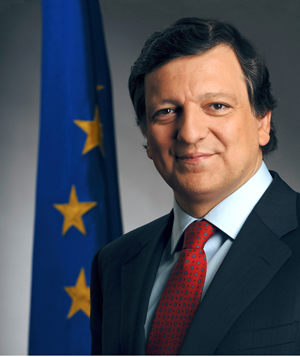
On September 22, José Manuel Barroso, President of the European Commission of the European Union, spoke before a full audience at Evans Hall. Hosted by the Yale Program in European Union Studies, the European Studies Council at the MacMillan Center, and the Yale School of Management, President Barroso spoke on the topic of “Europe in the New World Order.”
President Barroso, who previously served as the Prime Minister of Portugal from 2002-2004, is concluding his second five-year term as President of the European Commission. During his time as president, he has overseen enormous transformations at the European Union, including an expansion from 15 to 28 member states, as well as complex and constant global crises from the Eurozone debt crisis, the conflict in Ukraine, and the threats posed by ISIS.
In light of these challenges, President Barroso championed European interconnectivity. “To say my fate is not tied to your fate,” President Barroso remarked, “is like saying your end of the boat is sinking.”
Though President Barroso warned, “Disorder is the order of the day,” he assuaged listeners, remarking “democracies adapt to changing demands” and that now, more than ever, there is an “opportunity to reassert [our] commitment to democracy, globalization, and multiculturalism.”
In a conversation that both reflected on the history of the European Union and looked toward the future, President Barroso recalled how previous global crises have also presented the opportunity for democratic evolution and reform. The creation of the G20, which has become the premier forum for economic discussion, emerged from the need for a global response in light of the 2008 financial crisis.
“The need for European interdependence has never been more obvious,” President Barroso asserted. With “Ukraine and ISIS threatening [the] very idea of what Europe stands for internationally,” the need for European cooperation is clear. If Europe had failed to show its support for Ukraine, the continent would have been left “morally bankrupt.”
President Barroso acknowledged that a unified Europe is not without its fair share of challenges: democracy across 28 European countries can be slow; Euroskeptics, though limited, certainly exist in the European Parliament; and issues of migration have proven to be thorns in the side of a unified Europe. However, security and economic threats abound, and “Europeans can only face these challenges by being united.”
With a new world order emerging in Europe, President Barroso concluded, “Hopefully, we will have an order based on freedom, justice, rule of law, democracy, and human freedom.”
